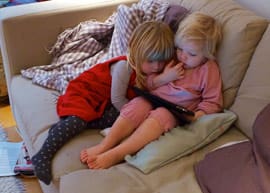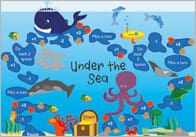Just Because a Child CAN does it mean they SHOULD?

A young mum proudly told me that her 18 month old son was really clever and ready for nursery. She sat him in front of the iPad and he promptly demonstrated how he could touch the screen and get the right answers. However, mum pointed out that he quickly got bored so knew how to change the programme to something else. I tried to look pleased for her while maintaining an expression of slight concern so that I could gently lead her to contemplate other possibilities.
After a few minutes on the iPad he slithered to the floor and made his way to the kitchen drawers and began to pull things out; much more interesting than the open cupboard full of plastic toys in the same area. We began to discuss what we had observed. The iPad apps were fast moving and the right answers were rewarded for completing the game. This is more likely to encourage addiction rather than promote sustained involvement and concentration. On the other hand, open-ended materials such as household utensils are much more interesting. They don’t provide answers but rather promote deeper thinking and open doors of possibilities. Let him play out in the garden, free from adult “control” or interference and take his time to explore the world.
A few days later I found myself at a meeting where people were applauding the rapid progress of the Reception class children in Phonics as a result of their 50 minutes phonics every day! I found myself clenching my hands and gritting my teeth, fighting the urge to rant. But I did manage to ask why they were spending 50 minutes on phonics when they had just said that they had a high percentage of children struggling with communication and language.
While I have reservations about some aspects of the EYFS, one thing I appreciate is the emphasis on the Prime Areas; building strong, secure foundations in these areas for, dare I say it, the first 6 years of life provides the best possible start in life. Technology and formal learning will then flow naturally for those confident, resilient, independent and secure children. My recent trip to Hungarian kindergartens has reinforced this. The emphasis there was on music and physical development, wellbeing, confidence etc. They spend at least two and a half hours outside every day, reducing it slightly during the recent freezing weather. Children up from the age of 3 up to 6 and 7 had a sleep every afternoon, told wonderful stories and sang in tune! Specialist teachers were leading small group intervention programmes in the gym, giving children the opportunity to develop their muscles, a sense of balance and their coordination. There was no expectation for children to read and write, although there were children who could. We were told that children then learn to read in about 3 months when they start school aged 7.
A question has formed as a result of my reflections: Just because children CAN do something does it automatically mean they SHOULD be doing it? Yes, some children CAN read or write or recite numbers at a very early age generated by their natural curiosity and drive to explore and grow. But does this therefore mean that all children SHOULD do it? Very young children CAN manipulate a mouse and show skill on a computer, but is this something they SHOULD be doing?
The EYFS clearly states that “children develop and learn in different ways and at different rates” (Introduction VI). So why do we have an obsession about pushing all children to achieve the same early learning goals at the same time?
It all leaves me contemplating a new approach – something slowed down. This would not only benefit the children but also reduce stress for teachers and practitioners. My 17 year old recently expressed his frustration with school as they never had the time to complete things properly in their two hour or one hour lesson slots. He asked, “Why can’t we spend a whole day on a subject so that we can see things through and finish them?”
David Elkind describes this as the “factory model of education, which hurries children because it ignores individual differences in mental abilities and learning rates and styles. Children are pressured to meet uniform standards…those who cannot keep up…are often labelled “learning disabled” (SEN) or ADHD.”(50) He also expresses concern about the “downward thrust”. “When school is looked upon as an assembly line and when there is pressure to increase production, there is a temptation not only to fill the bottles faster, but also to fill them earlier.”(50) Throughout his book “The Hurried Child” he describes different facets of modern life that hurry our children and therefore are stress inducing. His final chapter explores how to help children and describes play as “the antidote to hurrying” (213). “Play is nature’s way of dealing with stress for children as well as adults.” (218)
There it is again; that four letter word that has so much power and yet is so misunderstood. The word “play” is an adult definition of something that children do not need to define. They have an inner impulse to play and they don’t need sophisticated toys for this. A drawer of kitchen utensils or an afternoon in the garden does the job nicely.
Here are a few ideas to reflect on:
– Don’t introduce babies and toddlers to electronic devices.
– Vow to spend a substantial amount of time outside in a natural environment every day if possible.
– Limit computer exposure/screen time for Reception class children.
– Reception/Nursery Teachers and practitioners: take an honest look at your timetable. Does it allow extended time for children to explore and play? Why not revise your timetable by taking everything out and then rebuilding it around times of extended playing and being?
– Create cosy corners inside and outside where children can take refuge from the busy bustle around them.
– Find a place in your workplace to go and “chill” during the day. (I used to go in my walk in cupboard!)
– Provide interesting collections for children to play with: stones, shells, feathers, keys, buttons, ties, socks, sticks and twigs, leaves, fir cones, spoons…)
– Consider introducing “down time” after lunch. Create a calm oasis in the middle of a busy day where everyone has a lie down. Soft lighting and furnishings, gentle music and a lit candle can bring about a more gentle approach to the day and give everyone, including the adults, the opportunity to relax.
Judith is an inspiring and motivating trainer who combines theory and practical hands on experiences successfully to create an unforgettable day. You can download her consultancy leaflet here.
– Let’s have more singing, more playing, more exploring, more time!
Reference:
“The Hurried Child: Growing Up Too Fast Too Soon”, (3rd Edition): David Elkind Ph.D.: Da Capo Press 2001
Comments
Leave a Reply
Popular Teaching Resources
Stay Up To Date
Sign up for our newsletter and we’ll let you know when we create new early years resources.






hi,
Thanks for this wonderful website and this lovely article.
a ‘great’title – which really made me THINK!
It really helped me to take a step back and let my 3yr old son get on with his own interests and to do things in his own time.
i am one of those mums who would encourage him to show others what he can do – but i hope it doesn’t come across as overboard/showing off!
i’ve been in education for over ten years now and was always told that phonics wasn’t good for young kids and they should be left alone to PLAY. but after having my little one i think its best to say that its entirely up to the child if he/she is interested in letters etc… obviously WE as the adults would facilitate their learning.
with my son – i encouraged him through speech – obtaining lots of vocab – but at the same time – when i pointed out to him that his bottle was called a feeder, or the nappy was a nappy – then at the same time – if he was exposed to PRINT in the environment i would tell him what a particular letter was (usually sound).
so lots of rolemodelling – through play.
he loves reading and writing and it does come naturally to him. i’m very much into if you want to get on with it and write or read then fine. and if he doesn’t then thats fine too. but i still provide little activities for him to do IF HE IS INTERESTED!
i understand that not everyone would have the knowledge of how to do this – BUT i think parents SHOULD be educated in this area and they shouldn’t be told NO PHONICS AT AN EARLY AGE. it really should be NO SIT DOWN AT TABLE PHONICS!!!! i guess.